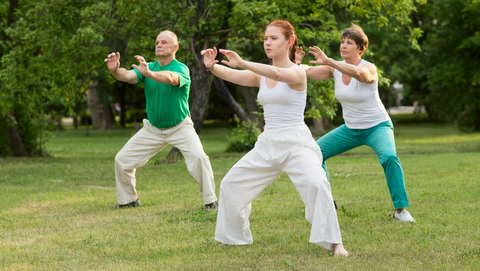Is Tai Chi for Me?
By Eva Timothy-Professional Practice Extension Assistant Professor

Finding an exercise routine that fits your needs can be a lot like going to a new restaurant and trying foods that are unfamiliar to you. Will it be something you enjoy? Will it agree with your body? Will it be enjoyable enough to convince you to return repeatedly? Tai Chi is like the unfamiliar food. It is an emerging form of exercise with many benefits. In order to decide if Tai Chi is a good fit for you, let’s explore its many benefits and provide you with an idea of how it is done.
Tai Chi is a continuous flow of movements forward, backward, and side to side while gently stretching and exerting the muscles in the body. It is a form of exercise that is most widely used amongst the Chinese to bring the mind and body in balance with one another (Li et al., 2001). Many studies have now been conducted to provide us with the full scope of health benefits for those who practice Tai Chi on a regular basis. Many classes offered vary from twice a week at 30 minutes a class to once a week for 1 hour.
Possible Tai Chi Benefits:
- Improved balance, stability, and strength
- Increased flexibility
- Decreased fear of falling
- Decrease in joint pain
- Increased range of motion
- Positive aerobic effects
- Improvements in well-being, such as improved alertness and feelings of relaxation with reduced feelings of stress and anxiety
- Decreased pain, anxiety, and feelings of depression for pregnant women
- Improved restfulness
- Lowered blood pressure and cholesterol
- Useful in the treatment and prevention of osteoporosis
- Lowers blood glucose levels
(Field, 2011; Li et al., 2001; Kuramoto, 2006)
As a result of the extensive research done on the benefits of tai chi, Utah State University (USU) Extension professionals across the state of Utah have now been trained and certified to teach this form of exercise. If you feel that this exercise program would be of benefit to you, please reach out to your local USU Extension office to find out if classes are offered near you.
References
Field, T. (2011). Tai Chi Research Review. Journal of Complementary Therapies in Clinical Practice, 17(3), 141–146. https://doi.org/https://doi.org/10.1016/j.ctcp.2010.10.002
Kuramoto, A.M. (2006). Therapeutic benefits of tai chi exercise: Research review. Wisconsin Medical Journal, 105(7), 42-46. http://www.7starsma.com/images/TCC-Benefits-12.pdf
Li, J. X., Hong, Y., & Chan, K. M. (2001). Tai Chi: Physiological characteristics and beneficial effects on health. British Journal of Sports Medicine, 35(3), 148–156. https://doi.org/10.1136/bjsm.35.3.148

